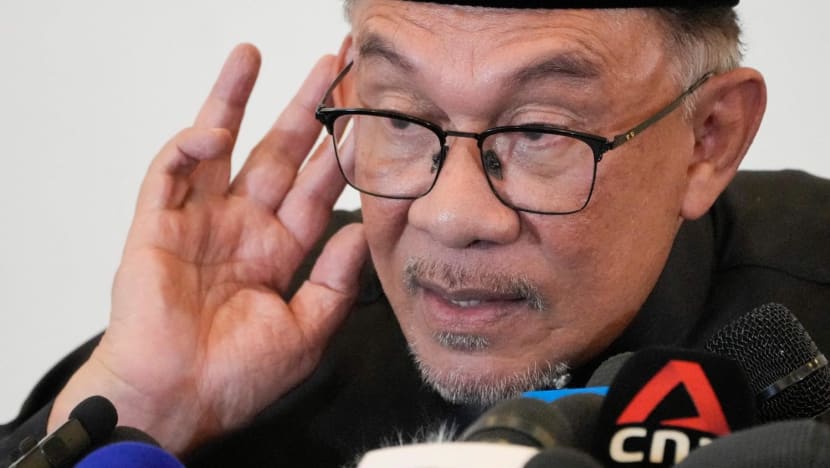Snap Insight: Malaysia PM Anwar will have some explaining to do over Cabinet decisions
Malaysia Prime Minister Anwar Ibrahim has fulfilled the important milestone towards rebuilding Malaysia after a divisive election, but he will have to explain some of his controversial appointments, says ISEAS-Yusof Ishak Institute's Dr Norshahril Saat.

Malaysia's newly appointed Prime Minister Anwar Ibrahim listens to a question after delivering his speech in Kuala Lumpur on Nov 24, 2022. (AFP/Vincent Thian/Pool)
SINGAPORE: One week after being appointed Malaysia’s 10th prime minister, Anwar Ibrahim has finally settled on his Cabinet line-up. Many expected the prime minister to name only critical ministerial posts in his unity government, given the complexity of negotiating with different parties and interests. Yet, the prime minister named his full Cabinet line-up.
While he has fulfilled the important milestone towards rebuilding and reforming Malaysia after a divisive election, the prime minister may have some explaining to Malaysians over his decisions in the next few days.
To be sure, Anwar should be given more time to develop his entire administration since he has not named the deputy ministers. As he explained in his opening, the basis of appointments rests on three core considerations: To honour the top three coalitions in the last election, Pakatan Harapan (PH), Barisan Nasional (BN) and Gabungan Parti Sarawak (GPS); his Cabinet’s priority to tackle the economy and inflated cost of living; and his commitment to form a stable government which now commands a two-thirds parliamentary majority.
UNITY GOVERNMENT OF DIVERSE INTERESTS
Based on these criteria alone, one can sympathise with Anwar’s decisions, notwithstanding the challenges of cobbling this unity government of diverse interests.
For example, the prime minister himself will undertake the finance portfolio. Interestingly, the last Malaysian prime minister to double-hat the premiership and finance portfolios was Najib Razak, although former prime ministers Mahathir Mohamad and Abdullah Badawi too had the same experience.
But Anwar can easily justify this by saying that he too, had held the finance portfolio when he was deputy prime minister to Dr Mahathir Mohamad in the 1990s. Malaysia then rose to become an Asian Tiger economy.
Moreover, naming two deputy prime ministers - Ahmad Zahid Hamidi from BN and Fadillah Yusof from GPS - is understandable because the two coalitions strengthened his government’s core.
Nevertheless, Anwar must further justify the appointment of Ahmad Zahid. After all, the United Malays National Organisation (UMNO) president was not named in the previous Muhyiddin Yassin and Ismail Sabri Yaakob Cabinets, despite the party being part of their governments.
The counter-argument for calling Ahmad Zahid is that he is the party leader crucial in stringing together the unity of the government. Plus, he was also the former deputy prime minister under Najib Razak. It was not only Ahmad Zahid that was appointed, UMNO deputy president Mohamad Hasan was also named as a defence minister.
The other key observation is that the Chinese-based multiracial Democratic Action Party (DAP) did not feature strongly in this Cabinet. The first PH government under Mahathir (from 2018 to 2020) was even bolder in rewarding the DAP.
In 2018, DAP’s Lim Guan Eng was named finance minister. However, DAP secretary-general Anthony Loke was given the transport ministry and Hannah Yeo the youth and sports portfolio.
Of note, Anwar named Tengku Zafrul Abdul Aziz trade minister despite being defeated in the last election. Tengku Zafrul was likely evaluated based on his technocratic background.
WHO WAS EXCLUDED?
But what is most interesting are the senior leaders excluded from this administration.
Remarkable absences are UMNO leaders with Cabinet experience, Hishammuddin Hussein and Ismail Sabri. The former is the son of Malaysia’s third prime minister, the latter is number three in UMNO hierarchy and a former prime minister himself.
Other former ministers Syed Saddiq from MUDA and Parti Warisan’s Shafie Apdal are the other notable absences.
While the naming of his Cabinet puts the question of government to rest, between now and when parliament sits on Dec 19, the prime minister may have some public communicating to do to explain some of his controversial appointments and exclusions, as these will lead to public discussions, online and offline.
Dr Norshahril Saat is Senior Fellow at the ISEAS – Yusof Ishak Institute and Coordinator at the Regional Social and Cultural Studies Programme.



















